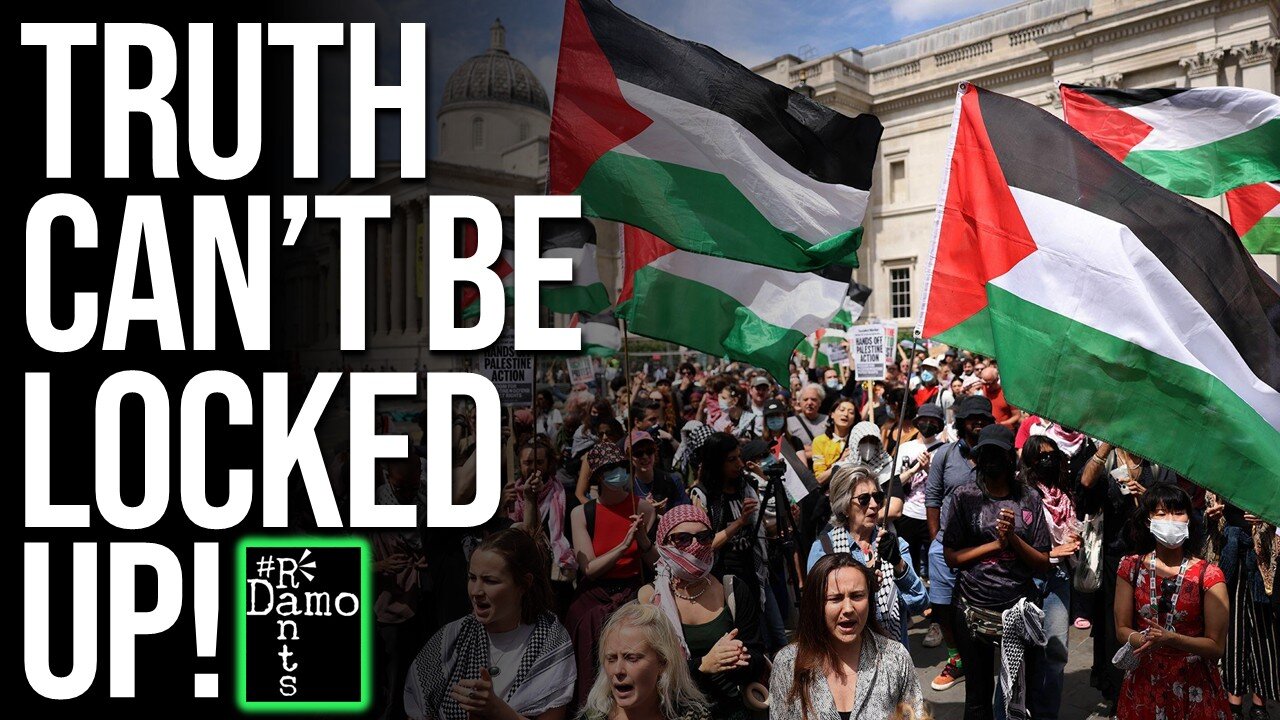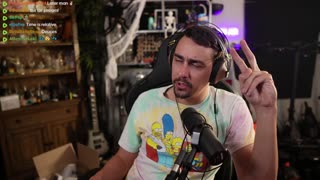Premium Only Content

Starmer Declared War on Dissent – And He’s Losing
Right, so Keir Starmer once built his reputation as a principled human rights barrister, defending civil liberties and portraying himself as a man of integrity who would stand up for justice even when it was politically inconvenient. Yet today, as we all well know, he seems to have sold out on all of that. Under his leadership, Britain has now become a country where pensioners are arrested for holding Palestinian flags, head teachers are dragged away under terrorism powers for displaying pages torn from Private Eye, and journalists are detained for reporting on Israel’s war crimes in Gaza. This is not counter-terrorism, but we’re all supposed to believe it is. It is the systematic criminalisation of dissent, a political strategy to silence criticism of Britain’s complicity in Israel’s atrocities. Starmer’s Labour government is at the centre of this assault on democratic freedoms and the real terrorism is actually be perpetrated by those our Zionist Prime Minister seeks to protect. The abuse of Section 12 of the Terrorism Act 2000, designed to target genuine terrorism, has been weaponised to suppress political speech, undermine free expression, our right to protest and real journalism, seeking to intimidate entire communities. As much as we report on Israeli atrocities and protest their actions, we need to equally be protesting against the Terrorism Act itself now surely, because rather than being there to protect, it is being weaponised against us instead?
Right, so Section 12 of the Terrorism Act 2000 is the root of the problem both in terms of the abuses of power we’re seeing deployed by the police and the persecution of journalists doing actual journalism with regards to Israeli atrocity. Israel is at the root cause of this, a genocidal apartheid state that has been conducting a reign of terror on innocent Palestinians in Gaza, that is now overtly planning concentration camps and mass displacement and our anti terrorism laws are being deployed against us and against real journalism, to protect that regime, because both Section 12 and Israel are the common denominator here. Section 12 was drafted in the wake of international terror attacks to prosecute those who invite or encourage support for proscribed organisations. Section 13 further criminalises the wearing or display of articles — a flag, a T-shirt, a banner — if doing so arouses “reasonable suspicion” of support for a banned group, vaguely worded, widely open to being abused therefore. At the time of its introduction, the law was justified to Parliament as a necessary tool to combat extremist propaganda. Yet, its language was deliberately broad, and that breadth has now been exploited to target peaceful dissent.
The proscription of Palestine Action earlier this month, a direct-action network targeting Britain’s arms manufacturers supplying Israel, provided a legal pretext for this crackdown. In a single weekend, over one hundred people have been arrested across the UK: fifty-five in London, seventeen in Bristol, sixteen in Manchester and eight in Truro. Many were arrested simply for holding placards reading, “I oppose genocide, I support Palestine Action.” But even those who made no reference to the banned group were not spared. The very words “Palestine” and “Action,” when placed together on banners, became enough to trigger arrests.
The evidence of abuse is overwhelming. In Glasgow, a sixty-four-year-old man was detained for holding a sign declaring, “Genocide in Palestine – Time to Take Action.” No link to Palestine Action was made, yet police claimed the words alone aroused reasonable suspicion. Those two words used in conjunction was enough. In Canterbury, armed officers threatened a woman holding nothing more than a Palestinian flag and a “Free Gaza” placard, warning her that she could be prosecuted under Section 12. In West Yorkshire, a retired head teacher was arrested for holding up a Private Eye article explaining what Palestine Action is, the magazine itself has not faced prosecution though — journalism itself branded as terror propaganda nonetheless though.
A High Court judge has already ruled that such applications of the law are unlawful. Yet police seemingly remain defiant. In an investigation published by Skwawkbox, officers admitted they would continue to treat anti-genocide flags and solidarity slogans as evidence of terrorist support. This is not rogue policing. It is a coordinated policy of intimidation, enabled and encouraged by a government, seen as far too close to Israel, that benefits from silencing pro Palestine critics.
Not only are pro-Palestine protesters being targeted, but journalists reporting on Israel’s actions are suffering the same legal repression under Section 12. Their cases highlight how the Government is using counter terror legislation to suppress dissent and control information.
Richard Medhurst, the British–Syrian investigative journalist known for his critical reporting on Gaza, became the first journalist arrested under Section 12. On 15 August last year, he was arrested at Heathrow Airport by multiple officers, held for nearly 24 hours without access to family or counsel, and had his electronic devices seized. He was informed he was arrested for “expressing an opinion or belief supportive of a proscribed organisation” — essentially his journalism being accused of being pro Hamas, rather than pro Palestinian. The National Union of Journalists (NUJ) and the International Federation of Journalists (IFJ) condemned the arrest, warning it would have a chilling effect on press freedom globally. In interviews, Medhurst described the experience as “a declaration of war on journalism”.
Media watchdogs expressed grave concern. Reporter Without Borders, through Rebecca Vincent, noted that similarly indiscriminate use of surveillance powers against journalists globally poses a universal threat to the freedom of the press.
Sarah Wilkinson, a freelance journalist and Palestine activist, was raided that same month by counter terrorism officers under Section 12. Her devices — phone, laptop— were seized, even her mother’s ashes jar was upturned and tipped over the floor and she was held while her bail temporarily restricted access to digital and travel facilities. World Socialist Website and other outlets documented how she was interrogated without clear charges, demonstrating how the law is being applied to journalistic expression.
Asa Winstanley, associate editor of The Electronic Intifada, saw his home raided by ten counter terrorism officers under both Sections 1 and 2 of the Terrorism Act 2006, and Section 12 of the 2000 Act. Authorities seized multiple electronic devices but notably did not arrest him. In a landmark ruling, the court found the raid “unlawful” and ordered the return of all of his seized items, criticising the legal basis for the warrant and highlighting that any search involving journalists’ material requires “extremely careful handling”. The National Union of Journalists also supported Winstanley’s legal challenge which saw him vindicated and exposed the abuse of this legislation.
These journalists' experiences mirror those of thousands of protesters: stripped of their freedom, vilified without evidence, and subjected to legal coercion. They underscore a disturbing pattern: Section 12 is not being used to prevent violence, but to silence anyone who dares to document or oppose state actions — whether carried out in support of Palestine or against the atrocities being committed by Israel.
The crackdown on Palestine solidarity is not happening by accident. It serves clear political and economic interests. The proscription of Palestine Action silences a movement that has repeatedly exposed Britain’s complicity in Israeli war crimes. By targeting arms manufacturers like Elbit Systems, Palestine Action disrupted a lucrative trade network crucial to Britain’s strategic and diplomatic relationship with Israel. For a government unwilling to jeopardise arms sales, criminalising this movement was an expedient solution, but it has fooled nobody, its an abuse, it has stifled legitimate protest. Criminal damage was caused certainly, but it wasn’t terrorism, yet defining it as such, silences us all on pain of arrest and as we’ve seen, plenty of people are quite prepared to face arrest for standing up foe what is right, even within the law, a retired magistrate being one of the people arrested in Truro this weekend as it happens.
There is also the matter of political donors and lobbying networks. Starmer has cultivated close relationships with pro-Israel lobby groups and wealthy backers. He needs their money, because he didn’t want ours, didn’t want to serve our interests, so he serves theirs instead. His refusal to call Israeli actions in Gaza genocide, despite overwhelming evidence, reflects this alignment. By aggressively targeting solidarity activists, he signals his loyalty to these influential circles, consolidating his position as a “responsible” Western leader in the eyes of allies such as Washington.
Domestically, the crackdown reinforces Starmer’s image as a tough, security-conscious leader. Determined to distance himself from the anti-establishment reputation of Jeremy Corbyn’s Labour, Starmer has embraced the optics of authority. The mass arrests under anti-terror laws are designed to reassure the political establishment and right-leaning voters that he will enforce “order” — even at the cost of basic freedoms.
Starmer’s approach exposes something deeper than political expediency. It reveals the true nature of his much-vaunted human rights record.
For years, Starmer traded on his background as a human rights lawyer. At Doughty Street Chambers, he defended protesters and political dissidents, exposing his current actions as not only authoritarian but disgustingly hypocritical too. His tenure as Director of Public Prosecutions also foreshadowed the opportunism to come: while maintaining the appearance of impartiality, he repeatedly sided with establishment priorities when pressured.
The current crackdown lays bare his hypocrisy. Starmer has not merely shifted his views, if he ever truly believed in them, which I doubt; he has totally abandoned them. His actions suggest he never genuinely believed in universal human rights. They were convenient for career advancement then, expendable now.
The precedent is dangerous though. If a pensioner can be arrested for waving a flag, or a head teacher detained for quoting a magazine, then climate activists, trade unionists and anti-war campaigners are all open to be cracked down on the moment it becomes politically expedient. The Home Office’s refusal to clarify that generic pro-Palestine speech is lawful is deliberate, granting police the discretion to act arbitrarily. In practice, Section 12 has become a tool for political policing, not counter-terrorism.
The psychological impact should not be underestimated by this. Communities, particularly Muslim and Arab Britons, now live under heightened surveillance and fear. Journalists, activists, and ordinary supporters of Palestine are second-guessing whether public expression is worth the risk, certainly for many it still very much is. Britain is sliding into an environment though where self-censorship becomes the norm, and dissent is stifled before it even reaches the streets.
Britain’s repression of Palestine solidarity mirrors broader Western trends, yet its application of anti-terror legislation against journalists and peaceful protesters marks a particularly authoritarian development. In Germany, entire pro-Palestinian demonstrations have been banned; in France, police violently dispersed rallies under emergency powers. But Britain’s weaponisation of the Terrorism Act is uniquely dangerous because it turns legislation meant for genuine terrorism inward against its own citizens, eroding trust in democratic institutions.
This crackdown is part of a longer British tradition though. The criminalisation of Irish republican activism in the 1970s, the harassment of anti-apartheid campaigners in the 1980s, and the mass arrests of Iraq War protesters under Blair all reveal a state willing to sacrifice civil liberties when politically convenient. Starmer has inherited and expanded this authoritarian lineage, making clear that his Labour government is more aligned with New Labour’s repressive tendencies than with any progressive legacy.
Defeating this authoritarian turn requires a multifaceted response. Legal action is essential. The ongoing High Court challenge to the Palestine Action proscription must be supported – not the same as supporting the group itself, which could land you in a jail cell, but the principle upon which that proscription occurred. Further judicial reviews are needed to challenge individual arrests and establish that peaceful protest cannot be criminalised under Section 12. Civil liberties groups such as Liberty, alongside legal chambers with a history of challenging state overreach, must take on these cases.
Political pressure must intensify. Starmer’s hypocrisy needs to be exposed relentlessly, both in Parliament and in the media. Left-wing MPs, trade unions, and grassroots Labour groups must forcefully challenge this oppressive leadership, demanding that the government rein in police abuses.
Grassroots mobilisation is equally important. Campaigns must frame this as not only a Palestine issue but a defence of fundamental democratic rights. Cross-movement alliances — bringing together pro-Palestine activists, climate campaigners, and trade unionists — can build a broader base of resistance to the laws being abused here. History offers lessons to draw from: the anti-apartheid movement and the mass mobilisation against the Iraq War show that sustained public pressure, even if not immediately successful, can shift public opinion and delegitimise authoritarian policies.
And of course legislative reform is crucial. Section 12 and 13 are too easily abused and must either be repealed or drastically rewritten to prevent their use against peaceful protesters and journalists and only against actual terrorism. Without such reform, Britain will remain vulnerable to future governments eager to silence dissent.
What is happening in Britain today is not just about Palestine. It is a litmus test for whether we will allow a government to criminalise dissent under the guise of counter-terrorism. Keir Starmer, once a human rights lawyer, is now the architect of Britain’s most significant clampdown on civil liberties in a generation. The Terrorism Act is being used not to protect the public from terror but to terrorise the public into silence. If we do not resist now, at some point there will be nothing left to defend. Today, it is Palestine solidarity activists. Tomorrow, it will be someone else who dares to speak truth to power. The struggle for Palestine is inseparable from the struggle for our own freedom, and the defence of one is the defence of the other.
It isn’t just in regards to protesters that Starmer is seemingly protecting Israel, it is seemingly doing so with regards to permitting charities to send millions in UK donations to the illegal settlements of the West Bank and in at least one evidenced example, it is directly linked to promoting the expansion of one such settler base. Get all the details of that story in this video recommendation here as your suggested next watch.
Please do also hit like, share and subscribe if you haven’t done so already so as to ensure you don’t miss out on all new daily content as well as spreading the word and helping to support the channel at the same time which is very much appreciated, holding power to account for ordinary working class people and I will hopefully catch you on the next vid. Cheers folks.
-
 4:44:18
4:44:18
CassaiyanGaming
5 hours agoArena Breakout: Infinite Dawg
20.6K2 -
 2:24:32
2:24:32
vivafrei
14 hours agoEp. 284: Ostrich Crisis Continues! Kirk Updates! Fed-Surrection Confirmed? Comey Indicted! AND MORE!
131K199 -
 DVR
DVR
Cewpins
5 hours agoSunday Sesh!🔥Rumble Giveaway Tonight!🍃420💨!MJ !giveaway
23.2K17 -
 3:03:11
3:03:11
Conductor_Jackson
6 hours agoLet’s Play BioShock Infinite Burial at Sea Episode 2!
24.6K1 -
 5:21:16
5:21:16
EricJohnPizzaArtist
6 days agoAwesome Sauce PIZZA ART LIVE Ep. #63: Charlie Sheen
54.7K4 -
 2:36:59
2:36:59
THOUGHTCAST With Jeff D.
4 hours ago $0.20 earnedTHOUGHTCAST Jeff and Keegan play Left 4 Dead 2. Classic games
25.1K1 -
 2:43:09
2:43:09
putther
9 hours ago $5.56 earned⭐ GTA ONLINE BOUNTIES THEN GTA IV ❗
68.6K4 -
 6:31:38
6:31:38
GritsGG
11 hours agoQuad Win Streaks!🫡 Most Wins in WORLD! 3600+
70.7K1 -
 1:20:13
1:20:13
Sports Wars
17 hours agoCollege Football UPSETS, MLB Playoff Drama, NFL Week 4
118K15 -
 LIVE
LIVE
Spartan
8 hours agoOMiT Spartan | Watching TSM 5K with chat + Black Myth Wukong + Ranked on Infinite Maybe
338 watching